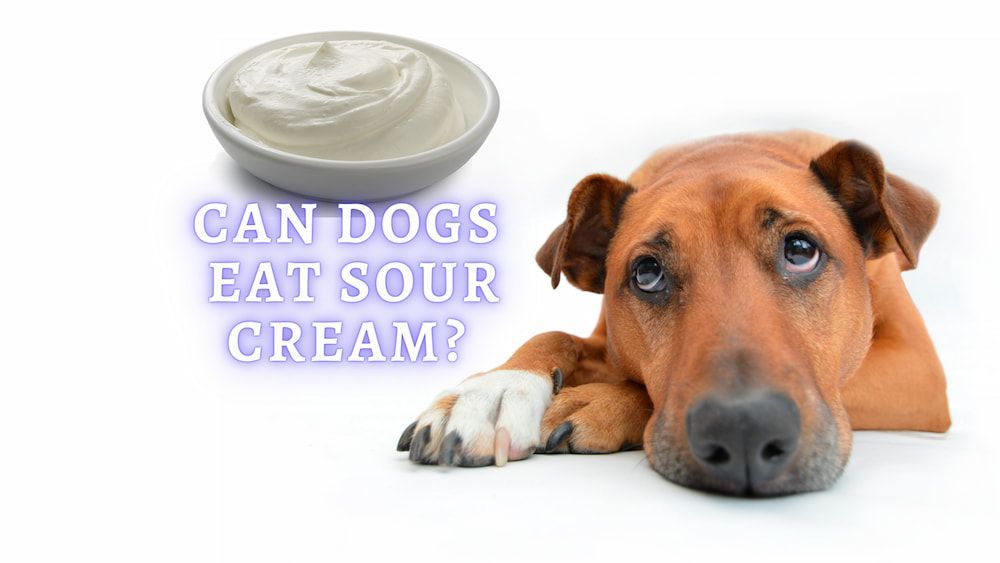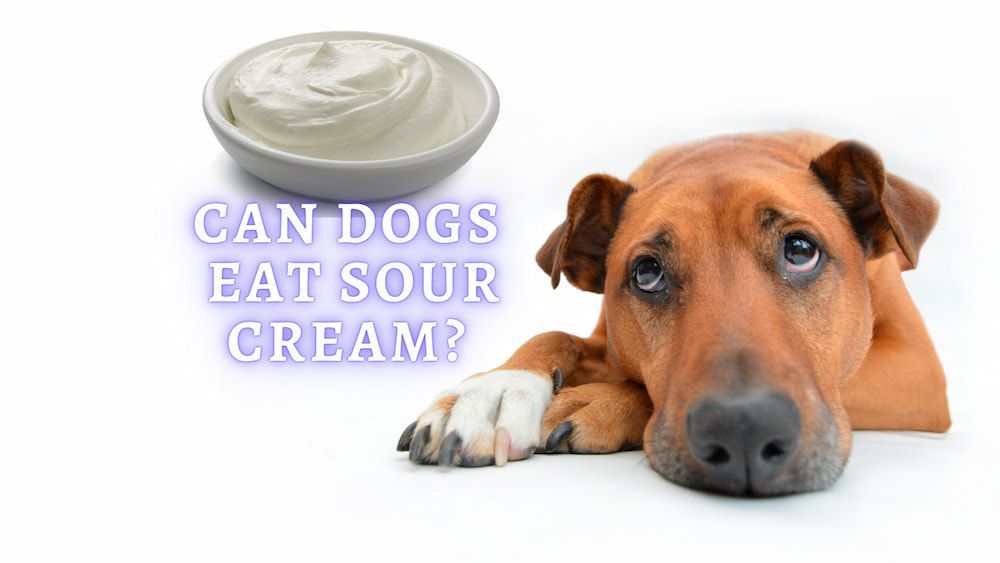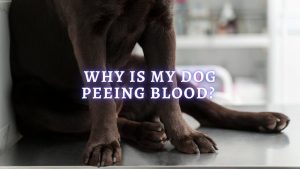
Sour cream is a popular topping for baked potatoes, nachos, and other goodies, and chances are that your canine companion has sampled a taste now and then. However, as a dog owner, you may wonder if offering your furry friend sour cream is a good idea. Dogs can eat it and in small amounts, it’s not harmful provided your dog can tolerate lactose, the natural sugar found in dairy products. It is important to know that, unlike most humans, it is difficult for dogs to digest dairy including sour cream, and in some cases overdoing it may cause some gastrointestinal upset in your best friend.


Wondering if dogs can eat sour cream? Read on for some tips and suggestions.
Is Sour Cream Safe for Dogs?
Sour cream is not toxic to dogs, and a little taste now and then most likely won’t hurt your dog. However, keep in mind that it is a fermented dairy product, and is made using regular cream, which is fermented using acetic acid bacteria. The bacteria that are added to the cream consume the cream’s sugar, giving it that unique taste. Generally, it is safe, but should be offered in moderation. There are also cases where you would avoid feeding it to your pooch, especially if they has GI issues or a sensitive tummy.
Sour Cream Nutritional Facts
There are several things to know about the nutritional aspects of sour cream, and some are listed below. However, it is important to note that sour cream does not provide any nutritional benefits to your dog and should be offered only as an occasional treat. Although sour cream contains some minerals, calcium, and other vitamins, it is not a reliable source of calcium or other nutrients.
- Lots of Calories. There are between 60-90 calories in two tablespoons of sour cream, meaning that this creamy treat packs a lot of calories. If you have a small dog, such as a Yorkie, two tablespoons could add a lot of empty calories that would make up 1/3-1/2 of her daily caloric needs. If you have a large dog, the extra calories may not be an issue, but you may want to avoid offering sour cream if your dog is overweight or has any underlying medical issues such as diabetes.
- Lots of Fat. In addition to added calories, sour cream also has quite a bit of saturated fat. Saturated fats are one of the unhealthy fats that have been found to contribute to high cholesterol (LDL) levels in humans. Although there are tiny amounts of protein and other nutrients in sour cream, keep in mind that it contains fat.
- Additives. Most sour cream products have additives to help preserve consistency and shelf-life, such as rennin, gelatin, and vegetable enzymes. Although many of these additives are not harmful to your pup, they offer no nutritional benefits.
What are the Potential Risks of Feeding Your Dog Sour Cream?
There are some potential risks in offering it to your pup:
- Weight Gain. As mentioned above, regular sour cream has a very high-fat content, so if you feed it to your dog regularly, it may cause some weight gain. It’s best to avoid offering sour cream if your pooch has weight issues, diabetes, or osteoarthritis. Extra pounds can put quite a load on old joints, and exacerbate mobility functionality in arthritic dogs.
- Gastrointestinal (GI) Upset. As sour cream is high in fat content, it can lead to GI problems in dogs. For example, if you have a dog who has had a history of pancreatitis (a potentially life-threatening condition where the pancreas becomes inflamed), any foods high in fat should be avoided as they will cause vomiting and diarrhea. Pups with sensitive stomachs may also experience GI discomfort. If your pup exhibits any signs of vomiting or diarrhea after ingesting sour cream, discontinue offering it and consult with your veterinarian.
- Lactose Intolerance. If your dog does well with dairy, then a small amount of sour cream will most likely not cause any issues. However, be advised that dogs do not have lactase, the enzyme needed to digest lactose (the sugar in dairy products). Many dogs have problems digesting dairy, and this is known as lactose intolerance. Dogs develop lactose intolerance when they transition into adulthood after weaning, and no longer need to nurse. Sour cream in significant amounts can wreak havoc on a dog who does not tolerate dairy and can cause gas, vomiting, and diarrhea.
- Xylitol Poisoning. There are many types of sour cream products available, from organic to low fat. As a dog owner, be aware that dairy products sweetened with artificial sweeteners can be toxic and even deadly for your pup. Substances like xylitol (an artificial sweetener) are extremely toxic to dogs and can drop a dog’s blood sugar dangerously low. Symptoms of Xylitol poisoning include vomiting, weakness, lack of coordination, seizures, and even coma. Keep an eye out for sugar-free claims on packaging when purchasing sour cream at your local grocer.
Does Sour Cream Benefit Your Dog?
It is a tasty addition to many human dishes, and like other dairy products, it does have some calcium, which is very helpful for bones and tooth development. Sour cream also contains other minerals and vitamins such as sodium, Iron, Phosphorus, and others. However, it contains these nutrients in trace amounts and does not offer your dog the essential nutrients she needs.


Photo by @Demkat from Freepik
READ MORE: How Long Does it Take a Dog to Digest Food?
Down Sides of Feeding Your Dog Sour Cream
There are some downsides to offering your pooch this as a treat, and some have been mentioned above:
- High-Calorie Content. For every two tablespoons of sour cream in a small serving, the calorie content is usually between 60-90 in total. The implication of this is that for every one bite, you get to take in a lot of calories.
- High-Fat Content. Calories are not the only downside of sour cream. There’s the saturated fat content to consider. Most products are 20% fat, which can cause problems for dogs with diabetes, obesity, or a history of pancreatitis.
- Additives. As mentioned above, most sour cream products have additives, and the most dangerous are artificial sweeteners such as Xylitol or Aspartame. Dogs cannot digest or process these additives, and some can be highly toxic and even deadly. Always check labels on your sour cream before offering a taste to your best friend.
What Can I Do If My Dog Accidentally Consumes a Lot of Sour Cream?
If your dog has had milk before without adverse effects, he will likely be able to stomach sour cream as it contains less lactose than milk. If your dog has accidentally eaten some, she’ll most likely be fine since it isn’t toxic to dogs. But, you should keep an eye on your pet as many dogs can be lactose intolerant and have an issue digesting dairy products. If your dog suffers from gas, vomiting, or diarrhea after eating sour cream, it most likely will clear up on its own, but if you are concerned, contact your veterinarian. Questions you veterinarian may ask are how much was eaten and was it flavored with onions or garlic.
What are the Alternatives to Sour Cream?


Photo by James Lacy on Unsplash
There are several alternatives to sour cream that you can try:
- Kefir. Kefir is a healthy, fermented dairy product that tastes a lot like a drinkable yogurt. A tablespoon of organic kefir or plain yogurt might be a better choice for your pooch than sour cream.
- Organic Butter. A tiny amount of organic butter from free-range dairy cows, plus a few drops of organic flaxseed oil mixed in with the dog’s food could also be a healthier alternative.
- Plain Yogurt. Yogurt is full of probiotics that can aid in digestion and can be a healthier choice. As an additional benefit, yogurt is much higher in protein, and lower in fat than sour cream.
- Peanut Butter. A much healthier meal for your dog is peanut butter since it has better protein content as compared to sour cream. Just make sure you get regular peanut butter that contains no artificial sweeteners.
- Bananas. Bananas, especially mashed, can offer a similar consistency as sour cream. Bananas are loaded with vitamins and minerals and can make a great snack for your furry friend. You can use ripe bananas and throw them in a food processor or mash them with a fork until they are soft and creamy. But don’t offer too much as bananas have sugar.
- Doggy Ice Cream Treats. Another alternative would be to offer your pup specially-made doggy ice cream treats. These are specially made products that can be a great alternative treat for your dog, especially on a hot day.
FAQs
What happens when dogs eat sour cream?
When a healthy dog eats sour cream, you may not notice any side effects, however, if your dog suffers from a sensitive stomach, or has an underlying health condition, she may experience GI side-effects such as bloating, gas, vomiting, or diarrhea. If your dog exhibits any GI symptoms after eating sour cream, discontinue offering it and call your veterinarian if you are concerned.
Can a dog eat sour milk?
The reason that milk turns sour is that it has undergone an overgrowth of bacteria, which creates gasses as they consume the lactose in the milk. These bacterial gases cause a sour taste. Most veterinarians advise against offering dogs sour milk as the extra bacteria can cause GI upset, vomiting, gas, and diarrhea. There is the risk of bacterial poisoning as well, as several detrimental bacteria produce toxins.
Can dogs have sour cream and cheddar chips?
If you are sitting on the couch and enjoying cheddar chips and a sour cream dip, be aware that your snack is high-fat and packed with sodium and calories, so it may not be the best snack for your canine companion. However, a little taste will most likely not hurt; just be sure that the sour cream and chips do not contain any garlic, onion, or artificial sweeteners.
What foods can upset a dog’s stomach?
Many foods can upset a dog’s stomach, including sour cream. As a dog owner, be aware of which foods your furry friend tolerates best, and if you observe any signs of GI upset, discontinue using those foods. Oils, butter, and other high-fat foods tend to cause GI upset in dogs. If you have any questions or concerns about your dog’s diet, consult your veterinarian.
{"@context":"https://schema.org","@type":"FAQPage","mainEntity":[{"@type":"Question","name":"What happens when dogs eat sour cream?","acceptedAnswer":{"@type":"Answer","text":"When a healthy dog eats sour cream, you may not notice any side effects, however, if your dog suffers from a sensitive stomach, or has an underlying health condition, she may experience GI side-effects such as bloating, gas, vomiting, or diarrhea. If your dog exhibits any GI symptoms after eating sour cream, discontinue offering it and call your veterinarian if you are concerned."}},{"@type":"Question","name":"Can a dog eat sour milk?","acceptedAnswer":{"@type":"Answer","text":"The reason that milk turns sour is that it has undergone an overgrowth of bacteria, which creates gasses as they consume the lactose in the milk. These bacterial gases cause a sour taste. Most veterinarians advise against offering dogs sour milk as the extra bacteria can cause GI upset, vomiting, gas, and diarrhea. There is the risk of bacterial poisoning as well, as several detrimental bacteria produce toxins."}},{"@type":"Question","name":"Can dogs have sour cream and cheddar chips?","acceptedAnswer":{"@type":"Answer","text":"If you are sitting on the couch and enjoying cheddar chips and a sour cream dip, be aware that your snack is high-fat and packed with sodium and calories, so it may not be the best snack for your canine companion. However, a little taste will most likely not hurt; just be sure that the sour cream and chips do not contain any garlic, onion, or artificial sweeteners."}},{"@type":"Question","name":"What foods can upset a dog's stomach?","acceptedAnswer":{"@type":"Answer","text":"Many foods can upset a dog's stomach, including sour cream. As a dog owner, be aware of which foods your furry friend tolerates best, and if you observe any signs of GI upset, discontinue using those foods. Oils, butter, and other high-fat foods tend to cause GI upset in dogs. If you have any questions or concerns about your dog's diet, consult your veterinarian."}}]}
READ MORE: Reasons Why Your Senior Dog Not Eating
Last Thoughts
Although sour cream is a delicious treat, it’s probably best not to give it to your dog as it’s likely to cause some adverse reactions such as GI upset. Most veterinarians will probably advise not to give dairy products to your pets, as there are no real benefits. Feeding your best friend high-quality dog food and treats is the best way to go.





